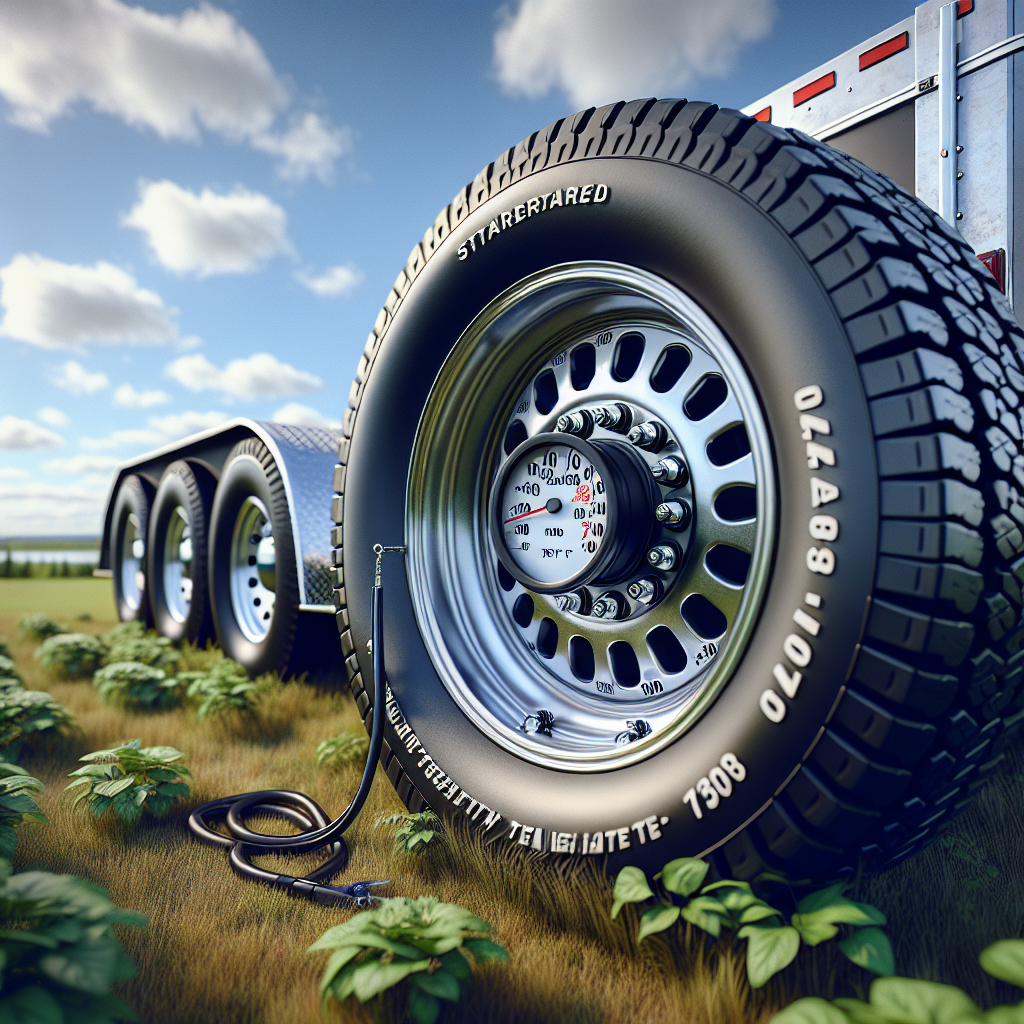Maintaining the proper temperature for your trailer tires is crucial for ensuring safe towing and preventing unexpected failures. Generally, the ideal operating temperature for **trailer tires** should range between 90°F to 120°F. However, various factors can influence this range, including the load being carried, road conditions, and tire type.
Understanding the temperature guidelines for trailer tires is essential. Here are some key points to consider:
- Load Capacity: Tires can heat up more when they are overloaded. Ensure that your trailer's load does not exceed the tire's rated capacity to keep temperatures in check.
- Inflation Pressure: Proper tire pressure is vital. Under-inflated tires generate more heat due to increased rolling resistance. Regularly check and maintain the recommended tire pressure.
- Weather Conditions: Hot weather can elevate tire temperatures. During summer months, it’s important to monitor tire heat more closely, especially on long trips.
To effectively monitor tire temperature, consider implementing a trailer monitoring system. This technology can provide real-time data on tire heat, allowing you to take proactive measures before any issues arise.
Don't take chances with your trailer. Tow with peace of mind, knowing that trailerwatchdog is standing guard.
Factors Influencing Trailer Tire Temperature

The temperature of trailer tires can be significantly affected by various factors, making it essential for trailer owners to understand these influences to ensure safe towing. Below are some primary factors that can lead to increased tire temperature:
- Load Weight: One of the most significant factors is the weight of the load being towed. Overloading a trailer can cause tires to work harder, leading to excessive heat build-up. Always adhere to the manufacturer's recommendations regarding load capacity.
- Tire Condition: Worn-out tires or those with uneven wear patterns can generate more heat. Regularly inspect tires for signs of damage or wear, and replace them as necessary to maintain performance.
- Inflation Levels: Maintaining proper tire pressure is crucial. Under-inflated tires can lead to increased rolling resistance, causing them to heat up more quickly. Conversely, over-inflation can also create problems, resulting in reduced contact with the road and uneven wear.
- Driving Habits: Aggressive driving, such as rapid acceleration, hard braking, and sharp turns, can increase tire temperatures. Smooth driving can help mitigate heat generation and prolong tire life.
- Environmental Conditions: The external environment plays a role as well. High ambient temperatures, hot pavement, and prolonged exposure to direct sunlight can all contribute to elevated tire temperatures.
By being aware of these factors, trailer owners can take proactive steps to monitor and manage tire temperatures effectively, ensuring a safer towing experience.
Signs of Overheating in Trailer Tires

Recognizing the signs of overheating in trailer tires is crucial for preventing tire failure and ensuring safe towing. Here are some common indicators that your trailer tires may be operating at dangerously high temperatures:
- Visible Damage: Look for any signs of damage, such as cracks, bulges, or blisters on the tire's surface. These imperfections can indicate that the tire is overheating and may lead to a blowout.
- Excessive Wear: Uneven or excessive wear patterns can be a sign of overheating. If the tread appears worn down more on one side or shows signs of melting, it's time to investigate further.
- Unusual Odors: A burning rubber smell while towing can signal that your tires are overheating. If you notice this odor, pull over safely and inspect the tires immediately.
- Increased Vibration: If you feel an unusual amount of vibration or shaking while towing, it could indicate that one or more tires are overheating. This can lead to further damage if not addressed promptly.
- Temperature Measurements: Using a tire temperature monitoring system, such as the one provided by TrailerWatchdog, can help you keep an eye on tire temperatures in real-time. A tire temperature exceeding 140°F (60°C) may indicate a potential overheating issue.
By being vigilant and aware of these signs, you can take corrective action before a tire failure occurs, ensuring a safer and more enjoyable towing experience.
Recommended Tire Temperature Range for Trailers
Understanding the recommended tire temperature range for trailers is essential for maintaining tire health and ensuring safe towing operations. Generally, tire temperatures should be monitored closely, especially during long hauls or in hot weather conditions.
The ideal operating temperature for trailer tires typically falls between 110°F (43°C) and 140°F (60°C). Within this range, tires perform optimally and maintain their structural integrity. Here's a breakdown of the temperature thresholds:
- Below 110°F (43°C): While this is generally safe, consistently low temperatures can indicate under-inflation or insufficient load, which can lead to uneven wear.
- 110°F to 140°F (43°C to 60°C): This is the optimal temperature range for trailer tires. At these temperatures, tires are adequately protected against overheating while providing the necessary grip and support.
- Above 140°F (60°C): This is a warning zone. Continued operation at these temperatures can lead to accelerated wear, potential blowouts, and catastrophic tire failure.
To help maintain your trailer tires within this recommended range, consider investing in a tire monitoring system, such as those offered by TrailerWatchdog. Monitoring tire temperature in real-time allows you to take proactive measures to avoid overheating and ensure a safer towing experience.
How to Monitor Trailer Tire Temperature Effectively

Monitoring trailer tire temperature is crucial for ensuring safety and preventing tire failure during your travels. Here are some effective methods to keep track of tire temperatures:
- Use Tire Temperature Sensors: Installing high-quality tire temperature sensors is one of the best ways to monitor tire heat accurately. These sensors provide real-time data and alerts when tire temperatures exceed safe levels, allowing for immediate action.
- Infrared Thermometers: For a more manual approach, an infrared thermometer can be used to check the surface temperature of each tire before and during trips. This method is practical for quick checks but requires you to stop and measure each tire individually.
- Visual Inspections: Regularly inspect your trailer tires for any signs of irregular wear or damage. Look for bulges, cracks, or excessive heat radiating from the tires, especially after long trips.
- Check Tire Pressure: Maintaining proper tire pressure is directly related to tire temperature. Check tire pressure regularly using a reliable gauge, and make adjustments as needed. Under-inflated tires can generate excessive heat, while over-inflated tires can lead to blowouts.
Incorporating these methods into your regular maintenance routine will help you keep your trailer tires within the recommended temperature range, ensuring a safer and more efficient towing experience.
Preventing Catastrophic Tire Failures in Trailers

Tire failures in trailers can lead to catastrophic events, causing accidents and significant damage to both the trailer and its cargo. To prevent such incidents, it's essential to adopt proactive measures:
- Regular Maintenance: Conduct regular inspections of your tires, including checking for tread wear, cracks, and bulges. Ensuring that your tires are in good condition is the first step in preventing failures.
- Temperature Monitoring: As previously discussed, monitoring tire temperature is vital. Consider investing in a trailer monitoring system like TrailerWatchdog, which provides real-time axle temperature and tire data. This system will alert you to any abnormal heat, allowing you to take immediate action.
- Proper Loading: Ensure that your trailer is loaded correctly and within the recommended weight limits. Overloading can increase tire wear and the risk of blowouts due to excessive heat buildup.
- Quality Tires: Invest in high-quality tires that are suited for your trailer's specific needs. Cheaper tires may save money upfront but can lead to higher risks of failure.
By implementing these preventive measures, you can significantly reduce the risk of catastrophic tire failures and ensure safer journeys. Tow with peace of mind, knowing that TrailerWatchdog is standing guard. Visit trailerwatchdog.com to learn more about how our monitoring system can elevate your trailer's safety.








